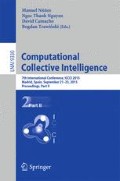Abstract
One of the most challenging tasks in the knowledge discovery process is the selection of the best classification algorithm for a data set at hand. Thus, tools which help practitioners to choose the best classifier along with its parameter setting are highly demanded. These will not only be useful for trainees but also for the automation of the data mining process. Our approach is based on meta-learning, which relies on the application of learning algorithms on meta-data extracted from data mining experiments in order to better understand how these algorithms can become flexible in solving different kinds of learning problems. This paper presents a framework which allows novices to create and feed their own experiment database and later, analyse and select the best technique for their target data set. As case study, we evaluate different sets of meta-features on educational data sets and discuss which ones are more suitable for predicting student performance.
Access this chapter
Tax calculation will be finalised at checkout
Purchases are for personal use only
Preview
Unable to display preview. Download preview PDF.
References
Cavalcanti, G., Ren, T., Vale, B.: Data complexity measures and nearest neighbor classifiers: a practical analysis for meta-learning. In: 2012 IEEE 24th International Conference on Tools with Artificial Intelligence (ICTAI), vol. 1, pp. 1065–1069, November 2012
Romero, C., Olmo, J.L., Ventura, S.: A meta-learning approach for recommending a subset of white-box classification algorithms for Moodle datasets. In: Proc. 6th Int. Conference on Educational Data Mining, pp. 268–271 (2013)
Espinosa, R., García-Saiz, D., Zorrilla, M.E., Zubcoff, J.J., Mazón, J.: Development of a knowledge base for enabling non-expert users to apply data mining algorithms. In: Accorsi, R., Ceravolo, P., Cudré-Mauroux, P. (eds.) Proceedings of the 3rd International Symposium on Data-driven Process Discovery and Analysis, Riva del Garda, Italy, August 30, 2013. CEUR Workshop Proceedings, vol. 1027, pp. 46–61. CEUR-WS.org (2013). http://ceur-ws.org/Vol-1027/paper4.pdf
Fayyad, U., Piatetsky-Shapiro, G., Smyth, P.: The kdd process for extracting useful knowledge from volumes of data. Commun. ACM 39(11), 27–34 (1996)
Hilario, M., Kalousis, A.: Building algorithm profiles for prior model selection in knowledge discovery systems. Engineering Intelligent Systems 8, 956–961 (2002)
Ho, T.K.: Geometrical complexity of classification problems (2004). CoRR cs.CV/0402020
Kalousis, A., Hilario, M.: Model selection via meta-learning: a comparative study. In: Proc. 12th IEEE International Conference on Tools with Artificial Intelligence, pp. 406–413 (2000)
Köpf, C., Taylor, C., Keller, J.: Meta-analysis: from data characterisation for meta-learning to meta-regression. In: Proceedings of the PKDD-00 Workshop on Data Mining, Decision Support, Meta-Learning and ILP (2000)
Kordík, P., Cerný, J.: On performance of meta-learning templates on different datasets. In: IJCNN, pp. 1–7. IEEE (2012)
Molina, M.M., Luna, J.M., Romero, C., Ventura, S.: Meta-learning approach for automatic parameter tuning: a case study with educational datasets. In: Proc. 5th International Conference on Educational Data Mining, pp. 180–183 (2012)
Peng, Y.H., Flach, P.A., Soares, C., Brazdil, P.B.: Improved dataset characterisation for meta-learning. In: Lange, S., Satoh, K., Smith, C.H. (eds.) DS 2002. LNCS, vol. 2534, pp. 141–152. Springer, Heidelberg (2002)
Pfahringer, B., Bensusan, H., Giraud-carrier, C.: Meta-learning by landmarking various learning algorithms. In: Proceedings of the 17th International Conference on Machine Learning, pp. 743–750. Morgan Kaufmann (2000)
Reif, M., Leveringhaus, A., Shafait, F., Dengel, A.: Predicting classifier combinations. In: Proceedings of the 2nd International Conference on Pattern Recognition Applications and Methods. INSTICC, SciTePress (2013)
Reif, M., Shafait, F., Goldstein, M., Breuel, T., Dengel, A.: Automatic classifier selection for non-experts. Pattern Analysis and Applications 17(1), 83–96 (2014). http://dx.doi.org/10.1007/s10044-012-0280-z
Rice, J.: The algorithm selection problem. Adv. Comput. 15, 65–118 (1976)
Romero, C., Ventura, S.: Data mining in education. Wiley Interdisciplinary Reviews: Data Mining and Knowledge Discovery 3(1), 12–27 (2013)
Segrera, S., Pinho, J., Moreno, M.N.: Information-theoretic measures for meta-learning. In: Corchado, E., Abraham, A., Pedrycz, W. (eds.) HAIS 2008. LNCS (LNAI), vol. 5271, pp. 458–465. Springer, Heidelberg (2008)
Vanschoren, J., Blockeel, H., Pfahringer, B., Holmes, G.: Experiment databases. Machine Learning 87(2), 127–158 (2012). http://dx.doi.org/10.1007/s10994-011-5277-0
Vilalta, R., Drissi, Y.: A perspective view and survey of meta-learning. Artificial Intelligence Review 18, 77–95 (2002)
Wolpert, D.H.: The supervised learning no-free-lunch theorems. In: Proc. 6th Online World Conference on Soft Computing in Industrial Applications, pp. 25–42 (2001)
Zorrilla, M., García-Saiz, D.: Meta-learning: can it be suitable to automatise the KDD process for the educational domain? In: Kryszkiewicz, M., Cornelis, C., Ciucci, D., Medina-Moreno, J., Motoda, H., Raś, Z.W. (eds.) RSEISP 2014. LNCS, vol. 8537, pp. 285–292. Springer, Heidelberg (2014). http://dx.doi.org/10.1007/978-3-319-08729-0_28
Author information
Authors and Affiliations
Corresponding author
Editor information
Editors and Affiliations
Rights and permissions
Copyright information
© 2015 Springer International Publishing Switzerland
About this paper
Cite this paper
Zorrilla, M., García-Saiz, D. (2015). Meta-Learning Based Framework for Helping Non-expert Miners to Choice a Suitable Classification Algorithm: An Application for the Educational Field. In: Núñez, M., Nguyen, N., Camacho, D., Trawiński, B. (eds) Computational Collective Intelligence. Lecture Notes in Computer Science(), vol 9330. Springer, Cham. https://doi.org/10.1007/978-3-319-24306-1_42
Download citation
DOI: https://doi.org/10.1007/978-3-319-24306-1_42
Published:
Publisher Name: Springer, Cham
Print ISBN: 978-3-319-24305-4
Online ISBN: 978-3-319-24306-1
eBook Packages: Computer ScienceComputer Science (R0)

